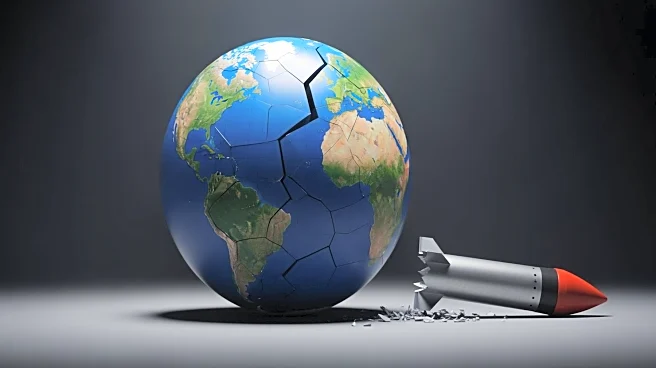What's Happening?
Russia launched a ballistic missile attack on Kyiv overnight on October 25, targeting the Ukrainian capital. Explosions were reported just before 4 a.m. local time, causing significant damage in several
districts. The Kyiv City Military Administration confirmed multiple fires in the Darnytskyi and Desnianskyi districts, with at least eight people injured, three of whom required hospitalization. The attack also damaged non-residential buildings, vehicles, and a kindergarten in the Dniprovskyi district. This incident follows a recent large-scale attack on October 22, which targeted energy infrastructure across Ukraine, resulting in six deaths and 44 injuries.
Why It's Important?
The missile attack on Kyiv underscores the ongoing conflict between Russia and Ukraine, highlighting the vulnerability of urban centers to military strikes. The escalation in attacks on energy infrastructure is particularly concerning as Ukraine braces for a harsh winter, potentially exacerbating humanitarian challenges. The increased frequency of such attacks may strain Ukraine's emergency response capabilities and impact civilian morale. Additionally, these developments could influence international diplomatic efforts and military support for Ukraine, as global stakeholders assess the situation's implications for regional stability.
What's Next?
Ukraine's Air Force has warned of additional incoming ballistic missiles, prompting air raid alerts across the country. Kyiv Mayor Vitali Klitschko has indicated preparations for a challenging winter, suggesting potential increases in civilian hardship. The international community may respond with heightened diplomatic pressure on Russia or increased support for Ukraine. Monitoring the situation closely, stakeholders will likely evaluate the effectiveness of existing sanctions and consider further measures to deter Russian aggression.
Beyond the Headlines
The attack raises ethical concerns regarding the targeting of civilian areas and infrastructure, potentially violating international humanitarian law. Long-term implications include the psychological impact on residents and the potential for increased migration from affected areas. The conflict may also influence global energy markets, as disruptions in Ukraine's energy infrastructure could affect supply chains and prices.









